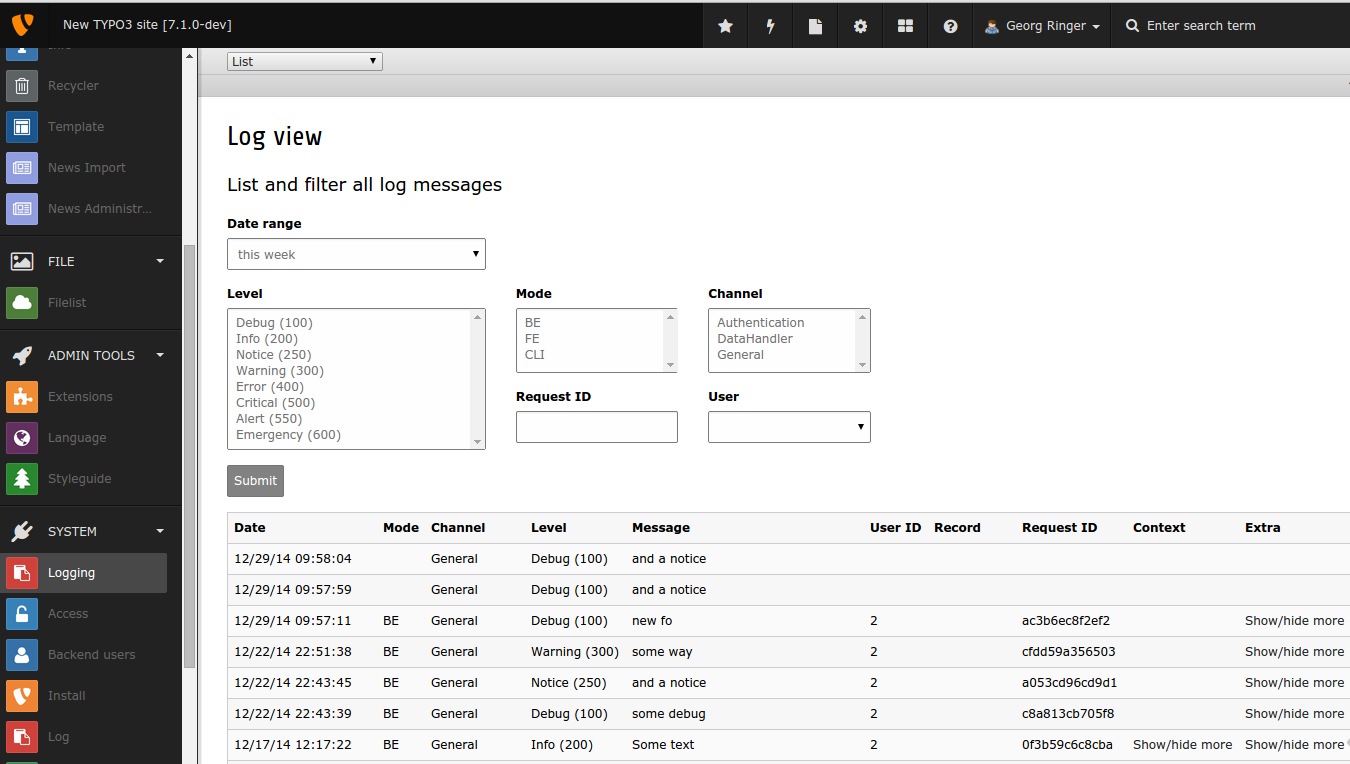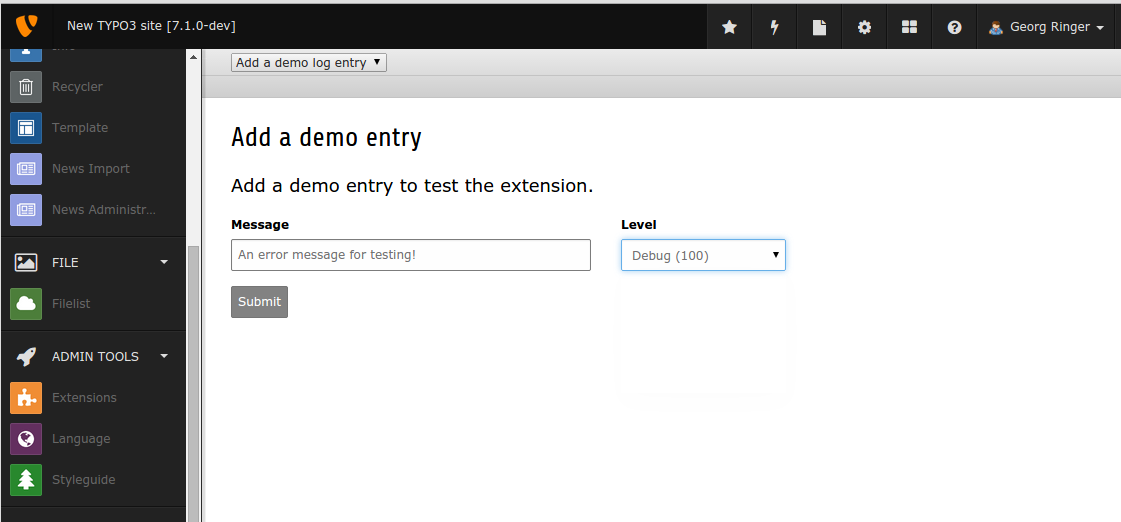georgringer / logging
Logging for TYPO3 CMS
Installs: 2 545
Dependents: 0
Suggesters: 0
Security: 0
Stars: 20
Watchers: 3
Forks: 7
Open Issues: 7
Type:typo3-cms-extension
pkg:composer/georgringer/logging
Requires
- monolog/monolog: ^1.20
- typo3/cms-core: >=7.6.0,<8.9.99
Requires (Dev)
- mikey179/vfsstream: 1.4.*@dev
- phpunit/phpunit: ~4.8.0
Replaces
- logging: dev-analysis-zYKNOK
- typo3-ter/logging: dev-analysis-zYKNOK
This package is auto-updated.
Last update: 2026-01-29 02:18:35 UTC
README
About
This extensions brings the awesome project monolog into the world of TYPO3 CMS.
The most important features are:
- Full support of monolog, including all handlers and processors
- A custom handler to write into the database of TYPO3
- A backend module to list & filter the entries
Screenshots

| alt: | Screenshot of the backend module |
|---|

| alt: | Create a test entry |
|---|
Requirements
TYPO3.CMS 7.6+
Your project set up with composer and monolog/monolog as requirement.
"config": { "vendor-dir": "Packages/Libraries", "bin-dir": "bin" }, { "repositories": [ { "type": "composer", "url": "http://composer.typo3.org/" }, { "url": "https://github.com/georgringer/logging.git", "type": "git" } ], "require": { "typo3/cms": "7.1", "georgringer/logging": "dev-master", "monolog/monolog": "*" } }
It might be possible that a later release will bring support for 6.2 LTS.
Installation
Install the extension as always. Currently (state of 7.2), packages installed via composer are automatically loaded. For 6.2 LTS, set the environment variable TYPO3_COMPOSER_AUTOLOAD to 1, e.g. in your .htaccess:
SetEnv TYPO3_COMPOSER_AUTOLOAD 1
Configuration
The configuration can be added to your typo3conf/AdditionalConfiguration.php file. The API is inspired by the current Logging framework of TYPO3 CMS.
The following logging levels are available:
* Debug (100) * Info (200) * Notice (250) * Warning (300) * Error (400) * Critical (500) * Alert (550) * Emergency (600)
Simple file logger
This is the configuration of a simple file logger which is written to typo3temp/out.log.
$GLOBALS['TYPO3_CONF_VARS']['MONOLOG'] = array(
'handlerConfiguration' => array(
'name' => 'General',
'handlers' => array(
\Monolog\Handler\StreamHandler::class => array(
'configuration' => array(
PATH_site . 'typo3temp/out.log',
\Monolog\Logger::ERROR
)
)
)
)
);
Every call will be logged where the level is at least ERROR (400).
Important: Take care if logging to a file which is available in a public directory with no access restriction!!
Log to the database
Sometimes it makes sense to log to the database. You can do that with the following configuration:
$GLOBALS['TYPO3_CONF_VARS']['MONOLOG'] = [
'processorConfiguration' => [
\GeorgRinger\Logging\Log\Monolog\Processor\Typo3Processor::class => []
],
'handlerConfiguration' => [
'name' => 'General',
'handlers' => [
\GeorgRinger\Logging\Log\Monolog\Handler\DatabaseHandler::class => []
]
]
];
The Typo3Processor will add additional information to the log entry:
- An internal process id of TYPO3 which will allow to filter all log entries within a single request
- The IP of the client
- The TYPO3 mode which is either BE, FE or CLI
- The ID of an existing backend or frontend user
Combined example
The logging framework allows to combine multiple handlers. Logging helps you not only while building a website or application but also during its whole lifetime! Especially on production sites it is likely that you can't use commands like print_r or die().
You might ignore debugging information, write warnings to a file and send errors via mail to yourself:
$GLOBALS['TYPO3_CONF_VARS']['MONOLOG'] = array(
'processorConfiguration' => array(
\GeorgRinger\Logging\Log\Monolog\Processor\Typo3Processor::class => array()
),
'handlerConfiguration' => array(
'name' => 'General',
'handlers' => array(
\Monolog\Handler\NativeMailerHandler::class => array(
'configuration' => array(
'admin@example.org',
'Error from website',
'no-reply@example.org',
\Monolog\Logger::ERROR
),
),
\Monolog\Handler\StreamHandler::class => array(
'configuration' => array(
PATH_site . 'typo3temp/out.log',
\Monolog\Logger::WARNING
),
),
\Monolog\Handler\SocketHandler::class => array(
'configuration' => array(
'tcp://127.0.0.1:7000'
),
'formatter' => array(\Monolog\Formatter\LogstashFormatter::class, array('Application', 'System')),
),
)
)
);
Loggers depending on class called
As in the current logging framework of TYPO3 CMS it is also with this extension possible to configure a different logging behaviour for different classes. An example would be to log all warnings to a file but for one important extension those warnings should also be sent as email.
Therefore, add the namespace of the specific extension to the logging configuration:
$GLOBALS['TYPO3_CONF_VARS']['MONOLOG'] = array(
'handlerConfiguration' => array(
'name' => 'General',
'handlers' => array(
\Monolog\Handler\StreamHandler::class => array(
'configuration' => array(
PATH_site . 'typo3temp/out.log',
\Monolog\Logger::WARNING
)
)
)
)
);
$GLOBALS['TYPO3_CONF_VARS']['MONOLOG']['GeorgRinger']['Shop'] = array(
'handlerConfiguration' => array(
'name' => 'Important Extension',
'handlers' => array(
\Monolog\Handler\NativeMailerHandler::class => array(
'configuration' => array(
'admin@example.org',
'Error from website',
'no-reply@example.org',
\Monolog\Logger::WARNING
)
),
\Monolog\Handler\StreamHandler::class => array(
'configuration' => array(
PATH_site . 'typo3temp/out.log',
\Monolog\Logger::WARNING
)
)
)
)
);
In the example above, every logging call within the namespace of GeorgRingerShop will trigger the 2nd configuration. All other calls will be handled by the first configuration.
How to log
Logging is very simple and similar to the used logging framework:
/** @var \Monolog\Logger $logger */
$logger = GeneralUtility::makeInstance(\GeorgRinger\Logging\Log\MonologManager::class)->getLogger(__CLASS__);
$logger->info('Some text', array('additional information' => 123));
Available methods for logging
The following methods are available for logging. The context is an optional array with additional information.
Debug
$logger->addDebug($message, $context); $logger->debug($message, $context);
Info
$logger->addInfo($message, $context); $logger->info($message, $context);
Notice
$logger->addNotice($message, $context); $logger->notice($message, $context);
Warning
$logger->addWarning($message, $context); $logger->warn($message, $context); $logger->warning($message, $context);
Error
$logger->addError($message, $context); $logger->err($message, $context); $logger->error($message, $context);
Critical
$logger->addCritical($message, $context); $logger->crit($message, $context); $logger->critical($message, $context);
Alert
$logger->addAlert($message, $context); $logger->alert($message, $context);
Emergency
$logger->addEmergency($message, $context); $logger->emerg($message, $context); $logger->emergency($message, $context);
Contribute!
Any contribution is highly welcomed. Please use the issue tracker of the GitHub Project!
If this extension is helpful for your, don't hesitate to donate!
